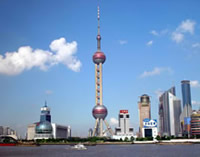|
|


ADVERTISEMENT
Buy Your own advertising
spaces!
.
Download Adobe Acrobat Reader to open [PDF] files.
Recent Visitors
Expo boosts Shanghai's financial ambitions
2010. 26 April
(chinapost.com.tw)
Shanghai has commissioned a new landmark to be unveiled during the World Expo that captures the city's rising global ambitions: a beefed-up replica of Wall Street's “Charging Bull.”
The red-tinted sculpture on the city's historic Bund river-front is intended to have a more vibrant look than its U.S. counterpart and will face skyward — a symbol of the city's lofty dreams of becoming a world financial center.
Those ambitions are expected to get a major boost from the six-month Expo, which will bring the world to Shanghai with 192 countries showcasing their best for up to 100 million expected visitors, most of them Chinese.
“Expo will help lift Shanghai's image in the world. It's an opportunity to show off China's achievements,” Lu Xiongwen, dean of Shanghai's Fudan University School of Management, said. “A successful Expo will bring greater resources and confidence.”
The central government has declared it aims to build the city, which has long been China's business heart, into an international financial hub by 2020.
And the Expo, the latest display of China's growing clout following the successful Beijing Olympics, is seen as accelerating the city towards that goal.
“Shanghai will make major breakthroughs this year in building a world financial center,” Shanghai Mayor Han Zheng told reporters last month.
The city has reportedly poured 400 billion yuan (US$58 billion) into infrastructure ahead of Expo.
It added hundreds of kilometers of new tracks to its Metro system, built new airport terminals, and restored the Bund, the strip of historic riverfront buildings dating from a time when foreign powers dominated the city.
Shanghai's stock market has also seen radical changes in the weeks before Expo as China moves past the financial crisis.
Short-selling, margin trading and stock index futures have been introduced, giving investors more sophisticated investment options. The Shanghai Stock Exchange is expected to see its first foreign listing this year.
HSBC has said it hopes to be the first. The banking giant was founded in the 19th century and helped the Bund earn the nickname the “Wall Street of Asia.” “Since the crisis has subsided, the logjam has been unblocked,” Standard Chartered China economist Stephen Green said.
“There's lots of signs of research being done by regulators on how to move things forward.”
However, those financial ambitions depend on liberalizing the flow of money in and out of China, Green said. Strict controls make it hard now to borrow overseas and even to bring in money earned from stock listings in Hong Kong.
Although loosening capital controls is probably part of Beijing's long-term plans, it is not yet ready to do so, Green said. He noted that while Shanghai is China's center for equities, Beijing is home to China's banks, the main source of financing in the country.
“The market is under development, therefore the people making the development decisions are very important and they're all in Beijing,” he said.
“It's hard to see significant regulatory control being turned over to Shanghai, which creates another challenge.”
But one should not underestimate the potential for change, said Pascal Sefrin, Societe General's China head of corporate and investment banking.
“The 2020 target is achievable if we take into consideration the economic development of China and the growing role of the yuan, which will become a convertible currency,” Sefrin said. “There is a written policy, the direction is set.”
Beijing has also said it wants Shanghai to become a shipping centre by 2020 and the city's government has continued to invest in industry, Fudan's Lu said.
He hopes the Expo, which takes place in a former shipbuilding yard, can be a turning point for Shanghai and ideas presented at the event can put it on track to becoming a knowledge economy.
Source: www.chinapost.com.tw

